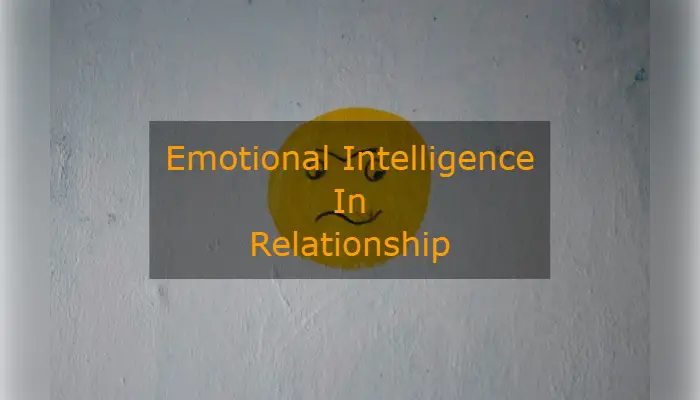Emotional intelligence (EI) is the key to building strong, fulfilling relationships. It allows partners to understand, manage, and express emotions in a healthy and constructive way. But what is emotional intelligence in a relationship, and why is it so important? In this blog, we’ll explore the essential elements of EI, how it impacts relationships, and practical ways to enhance it.

Table of Contents
Understanding Emotional Intelligence in a Relationship
Emotional intelligence refers to the ability to recognize, understand, and regulate emotions—both within yourself and in others. In the context of a romantic relationship, it determines how well partners communicate, handle conflicts, and support each other’s emotional well-being.
A relationship with high emotional intelligence is built on mutual respect, empathy, and the ability to manage stress and misunderstandings. Without EI, even the strongest connections can suffer from frequent conflicts, emotional detachment, or unresolved frustrations.
Key Components of Emotional Intelligence in a Relationship
To fully grasp what is emotional intelligence in a relationship, let’s break it down into five key components:
- Self-Awareness: Recognizing Your Emotions
Self-awareness is the foundation of emotional intelligence. It involves recognizing your emotions, understanding their triggers, and acknowledging how they impact your behavior in a relationship. When you’re self-aware, you can communicate your feelings effectively without blaming or projecting emotions onto your partner.
For instance, if you feel frustrated after a long day at work, acknowledging your emotions helps prevent unnecessary conflicts at home. Instead of snapping at your partner, you can express your need for space or relaxation in a constructive way.
- Empathy: Understanding Partner’s Emotions
Empathy is the ability to step into your partner’s shoes and truly understand their emotions. When partners practice empathy, they listen without judgment, validate each other’s feelings, and respond with care.
Imagine your partner had a tough day and seems distant. Instead of taking it personally, an empathetic response would be: “I can see that you’re feeling overwhelmed. Do you want to talk about it?” This simple act of understanding can strengthen the bond and prevent unnecessary misunderstandings.
- Emotional Regulation: Managing Feelings
Emotional regulation is the ability to manage emotions in a way that fosters harmony rather than conflict. It’s natural to experience anger, frustration, or sadness, but how you express those emotions matters.
Instead of reacting impulsively during an argument, emotionally intelligent partners take a step back, process their emotions, and choose a constructive response. This prevents emotional outbursts and encourages healthy conflict resolution.
- Effective Communication:
Communication is the backbone of any successful relationship. Emotional intelligence enables partners to express their feelings honestly and clearly while also listening actively to their partner’s concerns.
Using “I” statements instead of “you” accusations fosters a more constructive conversation. For example, instead of saying, “You never listen to me,” an emotionally intelligent response would be, “I feel unheard when we don’t discuss things openly.” This approach reduces defensiveness and encourages mutual understanding.
- Conflict Resolution: Handling Disagreements
No relationship is free from disagreements, but emotionally intelligent partners handle conflicts in a mature and respectful way. They focus on resolving issues rather than winning arguments.
A good strategy is to pause before reacting, listen actively, and find solutions that work for both partners. Rather than letting resentment build up, addressing concerns openly and respectfully leads to long-term relationship success.
Why Emotional Intelligence Matters in Relationships
Now that we’ve covered the key components, let’s explore why emotional intelligence is so vital in relationships.
Enhances Trust and Emotional Security
When both partners have high emotional intelligence, they create a safe space where feelings are acknowledged and respected. This builds trust and deepens emotional intimacy.
Reduces Unnecessary Conflicts
Couples with strong EI understand that disagreements are normal, but they handle them with patience and understanding. Instead of escalating conflicts, they seek resolution through open communication.
Promotes Mutual Growth
In an emotionally intelligent relationship, partners support each other’s personal and emotional growth. They encourage each other’s dreams, provide reassurance during difficult times, and celebrate successes together.
Strengthens Emotional Resilience
Life is full of challenges, and emotionally intelligent couples are better equipped to handle them together. Whether facing financial struggles, family conflicts, or external stressors, they work as a team and provide each other with emotional support.

How to Improve Emotional Intelligence in Your Relationship
Developing emotional intelligence takes time, but consistent effort leads to lasting benefits. Here are some practical ways to enhance EI in your relationship:
1. Practice Active Listening
Give your partner your full attention when they speak. Avoid interrupting or formulating a response before they finish talking. Instead, focus on understanding their feelings and needs.
- Cultivate Self-Awareness
Take time to reflect on your emotions and triggers. Journaling or practicing mindfulness can help you become more aware of how your emotions affect your interactions with your partner.
- Express Yourself Honestly
Be open about your feelings without fear of judgment. Use constructive language to share your emotions rather than bottling them up or expressing them in anger.
- Learn to Manage Stress and Emotions
Find healthy ways to cope with stress, such as exercising, meditating, or engaging in hobbies. Managing stress effectively prevents negative emotional spillover into your relationship.
- Show Empathy and Support
Make an effort to understand your partner’s emotions, even when you don’t fully agree with them. Small gestures of support, like a reassuring hug or kind words, can make a significant impact.
- Develop Emotional Flexibility
Being emotionally flexible means adapting to changes in your relationship with an open mind. Accept that both you and your partner will evolve over time, and approach challenges with a willingness to compromise and grow together.
- Seek Professional Guidance if Needed
Sometimes, couples need external support to build emotional intelligence. Therapy or relationship coaching can provide valuable tools and techniques to enhance communication and emotional connection.
Final Thoughts
Understanding what is emotional intelligence in a relationship is the first step toward building a strong, lasting bond. When partners develop self-awareness, practice empathy, regulate emotions, communicate effectively, and resolve conflicts maturely, they create a relationship filled with love, trust, and growth.
Emotional intelligence isn’t something you either have or don’t—it’s a skill that can be nurtured over time. By prioritizing emotional awareness and open communication, couples can strengthen their connection and create a fulfilling, harmonious partnership.

